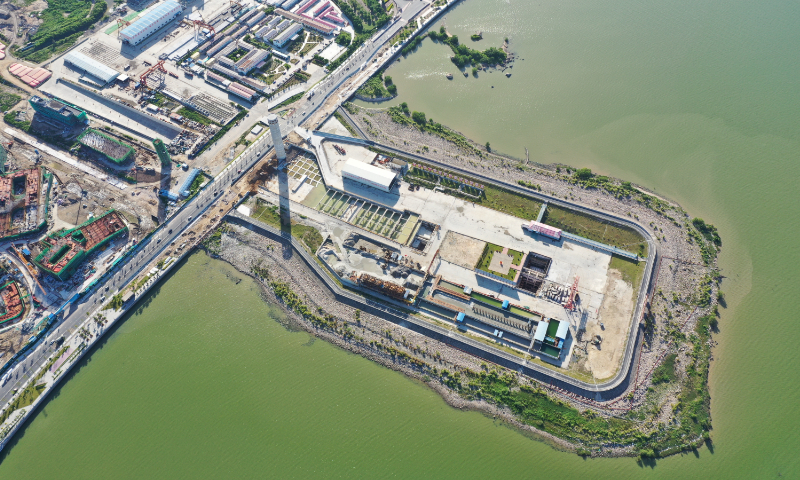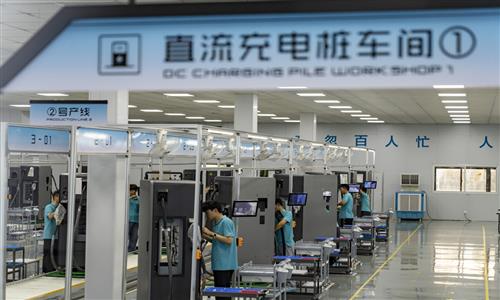Shantou accelerates a burgeoning private sector to shore up digital transformation
Coastal city relies on private entrepreneurship for economic advance

An aerial view of Shantou Bay in South China's Guangdong Province File photo: VCG
Shantou, a special economic zone (SEZ) located in coastal Guangdong Province, is home to a burgeoning private economy. Small and medium-sized enterprises (SMEs) spanning toys to electronic equipment and machinery manufacturing have served as a strong foundation for the city's economic growth and employment resilience.
Standing at a new historical starting point, local officials are aiming to accelerate the building of a fully digitalized special economic zone in a bid to become a digital hub that serves the country, Southeast Asia and beyond. In the process, the local Shantou municipal government is stepping up efforts to boost the enthusiasm and vitality of the private sector, which has become an indispensable force in promoting China's modernization.
Guangdong TianYiMa Information Industry Co, a local enterprise that specializes in software and information services, was listed on the ChiNext Index of the Shenzhen Stock Exchange in early 2021.
"Thanks to the government's timely guidance, our transformation from selling computer hardware and software to providing information-based services closely follows the development of the country's emerging industries including the digital economy, information technology and smart cities," Lin Shaoyong, deputy general manager of the company, told the Global Times.
Digital innovations
When Lin looks back on the company's past, he said that its success is inseparable from the innovative and adventurous spirit of local private entrepreneurs.
"When we decided to engage in the digital industry in the 1990s when the digital information technology was not well developed, we were largely nervous to take the kind of risky bets that may not pay off," Lin admitted.
Over the past years, Shantou has grasped the development opportunities to promote digital economy, including holding China Digital Economy Innovation Development Conference to attract both domestic and overseas investment to the special economic zone.
Shantou has actively promoted Huawei, Aliyun and other technology pioneers to set up local branches in the city, and it cultivated 29 local service providers. The city has been selected as one of the top 100 cities for digital transformation in the country.
In 2022, the city had a total of 41 enterprises listed under the category of new-generation electronic information industry, with their gross annual output reaching 15.7 billion yuan ($2.18 billion), an increase of 13.4 percent year-on-year, official data showed.
Stronger overseas push
The city's booming digital industry has attracted the attention of many foreign businesses. Narongsak Putthapornmongkol, president of the Thai-Chinese Chamber of Commerce, told the Global Times that the chamber is looking forward to strengthening economic and commercial exchanges with all parties, and trying to shore up stronger Thai Chinese business connections through the development of the digital industry in Shantou.
Wen Zhanbin, secretary of Shantou Municipal Committee of the Communist Party of China, said during a conference on China's digital economy on Wednesday that the city will build out a digital special economic zone in the new era, leveraging the city's advantages, such as one the most famed overseas Chinese hometowns, to augment the digital Belt and Road Initiative, while building an international data technology innovation platform.
Shantou aims to create a demonstration zone for the development of the digital economy that "serves the whole country, radiates to Southeast Asia and faces the world," Wen said.
In February, Guangdong held a conference vowing to promote high-quality development with a focus on private entrepreneurs. "As private entrepreneurs, we are happy to the government for the pro-growth policies to support private enterprises. I believe that the local government can implement these policies to help solve our problems and strengthen the confidence of private firms," Lin noted.
Since July, Chinese policymakers have released a range of policies including tax and fee reductions and cutting red tape to boost private sector, serving as a tailwind for the healthy development of the overall economy.
The private sector contributes more than 50 percent of the country's tax revenue, over 60 percent of the GDP growth, 70 percent of the technological innovation and more than 80 percent of urban employment. So, it's critical to boost sustainable growth and the sound development of the Chinese economy by promoting the private economy, according to Zhou Dewen, deputy director of the China Association of Small and Medium Enterprises.
Consistent policy support
According to data released by the association, the SME development index gained 0.2 points to 89.3 in July, indicating that SMEs have revved up their recovery momentum amid strengthening policy support.
Wang Peng, a research fellow from the Beijing Academy of Social Sciences, told the Global Times that some in Western media have continued to disparage China, and "the claims of Chinese authorities suppressing the private economy" are of very biased narrative.
Following guidelines issued by the Communist Party of China Central Committee and the State Council on boosting the growth of the private economy in July, the National Development and Reform Commission released 28 specific measures on August 1 and the People's Bank of China, the central bank, held a meeting with financial institutions and enterprises to support private enterprises on August 3.
"The policies are timely and reflect the central government's firm determination to bolster the private sector. The crux is how the policies are implemented at local governments," Zhou said. He said local governments have more to do in improving the business environment for private enterprises while boosting fund-raising for private firms.
"In addition, the private enterprises should also give into full play their own advantages and closely follow the development trend of the society to vigorously promote digital transformation," Wang said.
Moreover, the private enterprises could make even greater contributions to the country's overall economic transformation and industrial upgrade, technological innovation and high-quality economic growth by taking advantage of their creativity and entrepreneurship, as well as nimble market operation.



